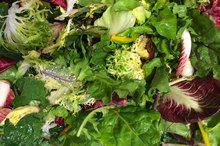What does fact checked mean?
At Healthfully, we strive to deliver objective content that is accurate and up-to-date. Our team periodically reviews articles in order to ensure content quality. The sources cited below consist of evidence from peer-reviewed journals, prominent medical organizations, academic associations, and government data.
The information contained on this site is for informational purposes only, and should not be used as a substitute for the advice of a professional health care provider. Please check with the appropriate physician regarding health questions and concerns. Although we strive to deliver accurate and up-to-date information, no guarantee to that effect is made.
Effects of Zinc With Potassium
Zinc and potassium are both minerals that contribute to healthy body functions, including the functions of the immune, circulatory, muscular and digestive systems. The use of zinc supplements can lead to decreased levels of magnesium, which also lowers the levels of potassium in the body. This negative effect can be avoided by supplementing the diet with magnesium supplements, thereby increasing the levels of potassium in the body.
Zinc
Zinc is a trace mineral obtained through food sources and supplements. Individuals who are at risk for zinc deficiencies include vegetarians, women who are pregnant or breastfeeding, infants who are breastfed and people with sickle-cell disease. The recommended daily amounts of zinc are 11mg for adult males, 8mg for adult females, 11mg for pregnant women and 12mg for breastfeeding women. Sources of zinc include:
- shellfish
- red meat
- poultry
- beans
- nuts
- seafood
- dairy products
- whole grains
- Zinc is a trace mineral obtained through food sources and supplements.
- The recommended daily amounts of zinc are 11mg for adult males, 8mg for adult females, 11mg for pregnant women and 12mg for breastfeeding women.
Potassium
Diarrhea & Dizziness With Magnesium Overdose
Learn More
Potassium is an essential mineral that is found in certain types of foods 1. Potassium aids in heart, muscle and digestive functions, and can prevent stroke, osteoporosis and kidney stones. People who are at risk for hypokalemia include those with anorexia nervosa or bulimia, people who have suffered from excessive vomiting or diarrhea, and people who use diuretics and laxatives. Fruits and vegetables are rich sources of potassium. Other sources of potassium include seafood, poultry and meat.
- Potassium is an essential mineral that is found in certain types of foods 1.
- Other sources of potassium include seafood, poultry and meat.
Magnesium
If you're taking zinc supplements, it is important to add magnesium to the diet. The recommended daily amounts of magnesium are 400mg for adult males, 310mg for adult females, 350mg for pregnant women and 310mg for breastfeeding women. Magnesium can be found in food sources such as green vegetables, beans and nuts, and whole grains.
Related Articles
References
Resources
Writer Bio
Hillary Rolston began freelance writing in 2009. Her work has appeared on LIVESTRONG.COM, and areas of special knowledge include child and adolescent growth and development, and, in particular, the academic and emotional needs of children with disabilities. She is pursuing her Master of Arts and Education Specialist degrees in school psychology from the Citadel Graduate College.









